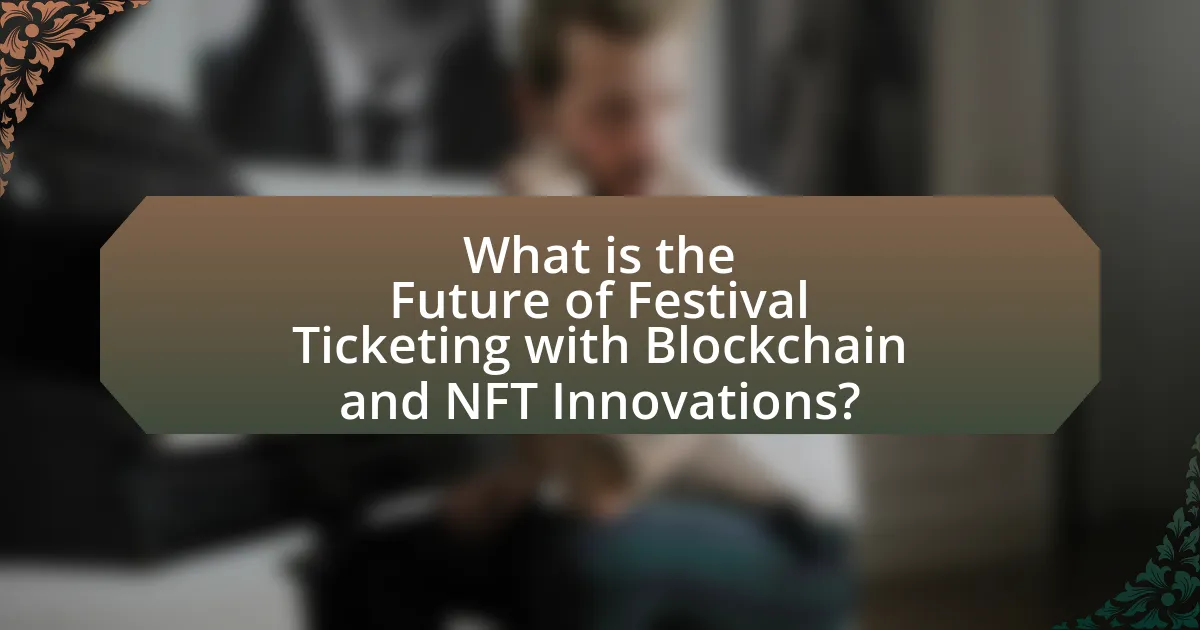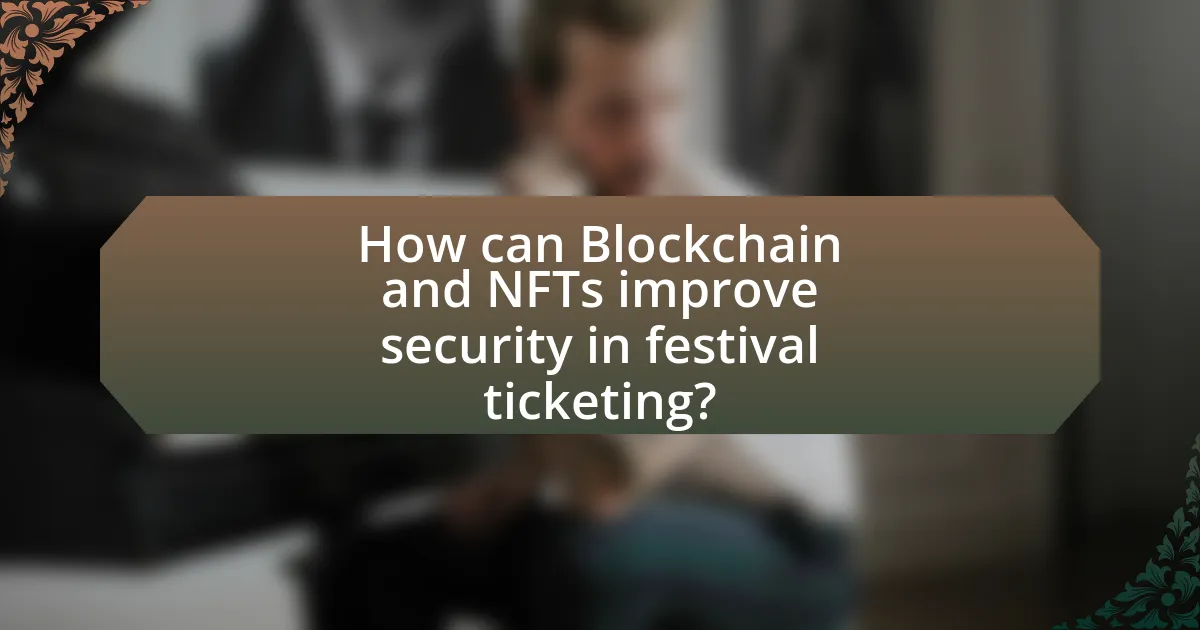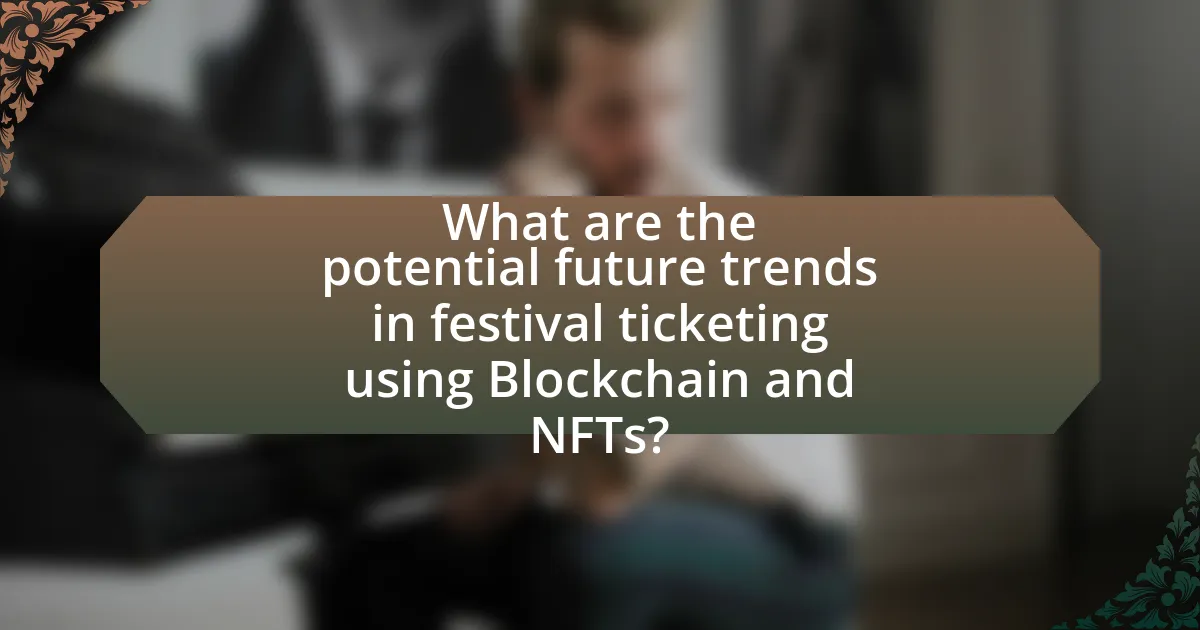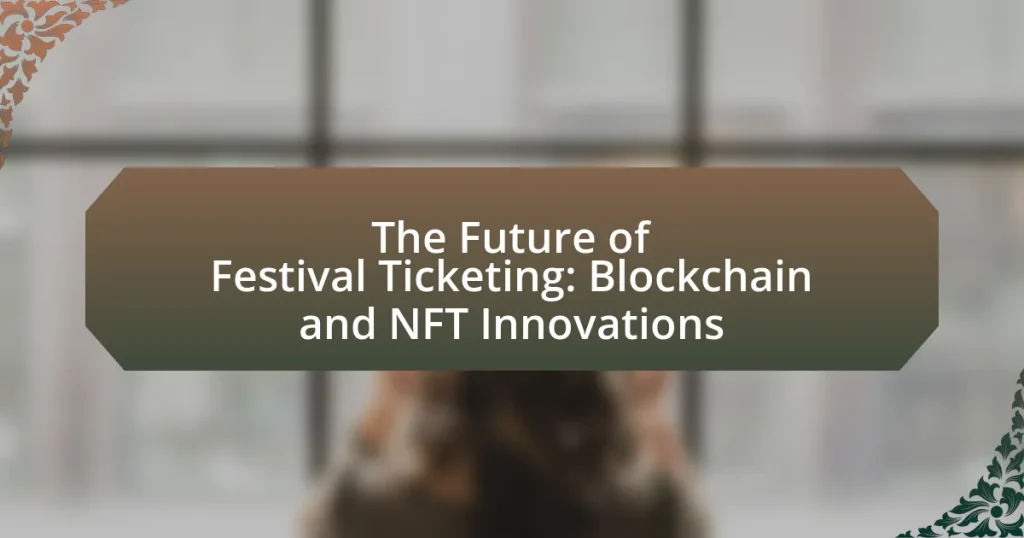The article focuses on the future of festival ticketing through the integration of blockchain technology and NFTs (non-fungible tokens). It highlights how these innovations enhance security, transparency, and user engagement by creating tamper-proof ticketing systems that reduce fraud and scalping. Key features of blockchain in ticketing include decentralization, immutability, and smart contracts, which streamline transactions and improve the overall attendee experience. The article also addresses current challenges in the ticketing industry, such as counterfeit tickets and scalability issues, while exploring potential future trends and best practices for implementing these technologies effectively.

What is the Future of Festival Ticketing with Blockchain and NFT Innovations?
The future of festival ticketing with blockchain and NFT innovations is characterized by enhanced security, transparency, and user engagement. Blockchain technology allows for the creation of tamper-proof ticketing systems, reducing fraud and scalping, as each ticket can be uniquely verified on a decentralized ledger. NFTs, or non-fungible tokens, enable the issuance of digital tickets that can include unique features, such as exclusive content or experiences, enhancing the value for attendees. According to a report by Deloitte, the use of blockchain in ticketing can potentially save the industry billions by minimizing ticket fraud and improving operational efficiencies. This integration of blockchain and NFTs is expected to revolutionize how festivals manage ticket sales, leading to a more secure and engaging experience for festival-goers.
How do Blockchain and NFTs redefine traditional ticketing systems?
Blockchain and NFTs redefine traditional ticketing systems by providing a secure, transparent, and decentralized method for ticket issuance and ownership verification. This technology eliminates issues such as fraud and scalping, as each ticket can be uniquely identified and traced on the blockchain. For instance, using NFTs allows event organizers to create digital tickets that are tamper-proof and can include smart contracts, enabling automatic royalty payments to artists and promoters upon resale. According to a report by Deloitte, the use of blockchain in ticketing can reduce costs associated with ticket fraud by up to 80%, demonstrating its effectiveness in enhancing the integrity of ticket transactions.
What are the key features of Blockchain technology in ticketing?
The key features of Blockchain technology in ticketing include transparency, security, and decentralization. Transparency allows all transactions to be recorded on a public ledger, enabling stakeholders to verify ticket authenticity and ownership easily. Security is enhanced through cryptographic techniques that protect against fraud and unauthorized access, ensuring that tickets cannot be duplicated or counterfeited. Decentralization eliminates the need for intermediaries, reducing costs and allowing direct transactions between buyers and sellers. These features collectively enhance the efficiency and trustworthiness of the ticketing process, as evidenced by the growing adoption of Blockchain solutions in various events and festivals.
How do NFTs enhance the value of festival tickets?
NFTs enhance the value of festival tickets by providing unique, verifiable ownership and additional benefits that traditional tickets cannot offer. Each NFT ticket is stored on a blockchain, ensuring authenticity and preventing counterfeiting, which increases trust among buyers. Furthermore, NFTs can include perks such as exclusive access to VIP areas, merchandise, or future events, adding tangible value beyond mere entry. For instance, a study by NonFungible.com indicates that NFT ticketing can lead to higher resale values due to their scarcity and added features, making them more desirable than standard tickets.
What challenges does the festival ticketing industry face today?
The festival ticketing industry faces significant challenges today, including ticket fraud, scalability issues, and the need for enhanced customer experience. Ticket fraud remains a persistent problem, with counterfeit tickets costing the industry millions annually; for instance, in 2019, ticket fraud was estimated to be a $1 billion issue in the U.S. alone. Scalability issues arise as festivals grow in size and complexity, making it difficult for traditional ticketing systems to handle increased demand efficiently. Additionally, the industry must adapt to evolving consumer expectations for seamless digital experiences, which necessitates the integration of innovative technologies like blockchain and NFTs to provide secure, transparent, and user-friendly ticketing solutions.
How do counterfeit tickets impact festivals and attendees?
Counterfeit tickets significantly undermine the integrity of festivals and negatively affect attendees by causing financial loss and diminishing the overall experience. Festivals face revenue losses due to counterfeit tickets, which can lead to increased security measures and operational costs. For attendees, purchasing counterfeit tickets results in denied entry, wasted money, and disappointment, as they miss out on the event. According to a report by the Event Safety Alliance, counterfeit tickets can account for up to 10% of ticket sales at major events, illustrating the scale of the issue. This situation highlights the need for innovative solutions like blockchain and NFTs, which can provide secure, verifiable ticketing options to combat counterfeiting effectively.
What are the limitations of current ticketing systems?
Current ticketing systems face several limitations, including issues with transparency, security, and scalability. These systems often lack transparency, making it difficult for consumers to verify the authenticity of tickets, which can lead to fraud. Security vulnerabilities expose personal and financial information to potential breaches, as evidenced by numerous high-profile hacks in the ticketing industry. Additionally, scalability challenges arise during high-demand events, resulting in website crashes and long wait times for consumers. According to a report by the International Ticketing Association, 30% of ticket buyers experience frustration due to these limitations, highlighting the need for improved solutions in the ticketing landscape.

How can Blockchain and NFTs improve security in festival ticketing?
Blockchain and NFTs can significantly improve security in festival ticketing by providing a decentralized and tamper-proof system for ticket verification. This technology ensures that each ticket is unique and cannot be duplicated, as each NFT represents a distinct digital asset recorded on the blockchain. The use of smart contracts further enhances security by automating the ticket transfer process and enforcing rules, such as resale restrictions, directly within the code. According to a report by the World Economic Forum, blockchain can reduce ticket fraud by up to 90%, demonstrating its effectiveness in creating a secure ticketing environment.
What security features do Blockchain and NFTs provide?
Blockchain and NFTs provide enhanced security features such as immutability, transparency, and decentralized verification. Immutability ensures that once data is recorded on the blockchain, it cannot be altered or deleted, which protects against fraud and unauthorized changes. Transparency allows all transactions to be publicly accessible and verifiable, enabling users to trace the history of ownership and authenticity of NFTs. Decentralized verification eliminates the need for a central authority, reducing the risk of single points of failure and enhancing trust among users. These features collectively contribute to a more secure and reliable ticketing system in the context of festivals, minimizing issues like counterfeiting and scalping.
How does decentralization contribute to ticket authenticity?
Decentralization enhances ticket authenticity by utilizing blockchain technology to create immutable records of ticket ownership and transactions. This technology ensures that each ticket is uniquely identifiable and verifiable, reducing the risk of counterfeiting. For instance, when a ticket is issued on a blockchain, its details are encrypted and stored across a distributed network, making it nearly impossible to alter or duplicate. According to a report by the World Economic Forum, blockchain can significantly reduce fraud in ticketing by providing transparent and traceable transaction histories, thereby reinforcing the authenticity of each ticket sold.
What role does smart contract technology play in ticket transactions?
Smart contract technology automates and secures ticket transactions by enabling self-executing agreements on blockchain platforms. This technology ensures that ticket sales, transfers, and validations occur without intermediaries, reducing fraud and enhancing transparency. For instance, smart contracts can automatically verify ticket ownership and enforce terms of sale, such as resale restrictions, directly on the blockchain. This capability is supported by the immutable nature of blockchain, which records all transactions in a tamper-proof manner, thereby providing a reliable audit trail.
How do Blockchain and NFTs facilitate better user experiences?
Blockchain and NFTs enhance user experiences by providing secure, transparent, and verifiable transactions. Blockchain technology ensures that ticket ownership is easily traceable and immutable, reducing fraud and scalping, which are common issues in traditional ticketing systems. NFTs, as unique digital assets, allow for personalized and collectible experiences, enabling users to own and trade tickets in a way that adds value beyond mere entry. For instance, a study by the University of Cambridge highlights that blockchain can reduce ticketing fraud by up to 90%, demonstrating its effectiveness in improving user trust and satisfaction.
What advantages do attendees gain from NFT ticketing?
Attendees gain several advantages from NFT ticketing, including enhanced security, ownership verification, and potential for resale. NFT ticketing utilizes blockchain technology, which ensures that tickets are tamper-proof and can be easily verified, reducing the risk of fraud. Additionally, each NFT ticket is unique and can provide proof of ownership, allowing attendees to have confidence in their purchase. Furthermore, NFT tickets can facilitate a secondary market for resale, enabling attendees to sell their tickets securely and potentially at a profit, as seen in events where demand exceeds supply. This combination of security, ownership, and resale potential makes NFT ticketing an appealing option for attendees.
How can Blockchain streamline the ticket purchasing process?
Blockchain can streamline the ticket purchasing process by providing a decentralized and transparent platform for transactions. This technology eliminates intermediaries, reducing costs and the potential for fraud. For instance, smart contracts on the blockchain automatically execute transactions when predefined conditions are met, ensuring secure and efficient ticket transfers. Additionally, blockchain’s immutable ledger allows for real-time tracking of ticket ownership, which helps prevent scalping and counterfeit tickets. According to a report by Deloitte, implementing blockchain in ticketing can enhance security and improve customer trust, leading to a more efficient purchasing experience.

What are the potential future trends in festival ticketing using Blockchain and NFTs?
The potential future trends in festival ticketing using Blockchain and NFTs include enhanced security, increased transparency, and improved fan engagement. Blockchain technology can significantly reduce ticket fraud by providing a secure, immutable ledger for ticket transactions, ensuring that each ticket’s authenticity can be verified. Additionally, NFTs can enable unique digital ownership of tickets, allowing for personalized experiences and the potential for resale on secondary markets without the risk of counterfeiting. According to a report by Deloitte, the use of Blockchain in ticketing can streamline the ticketing process, reduce costs, and enhance customer trust, which are critical factors for the future of festival ticketing.
How might festival organizers leverage Blockchain technology?
Festival organizers might leverage Blockchain technology to enhance ticketing security and streamline transactions. By utilizing Blockchain, they can create tamper-proof digital tickets that reduce fraud and scalping, ensuring that each ticket is unique and verifiable. This technology allows for transparent tracking of ticket ownership and resale, which can be managed through smart contracts that automate the transfer process and enforce terms of sale. According to a report by Deloitte, Blockchain can significantly reduce operational costs associated with ticketing by eliminating intermediaries, thus providing a more efficient and cost-effective solution for both organizers and attendees.
What innovative ticketing models could emerge from NFT usage?
Innovative ticketing models that could emerge from NFT usage include dynamic pricing, personalized experiences, and secondary market control. Dynamic pricing allows ticket prices to fluctuate based on demand, similar to airline ticketing, ensuring that prices reflect real-time market conditions. Personalized experiences can be facilitated through NFTs that grant access to exclusive content or VIP areas, enhancing the overall attendee experience. Additionally, NFTs can enable event organizers to maintain control over the secondary market by embedding resale royalties directly into the smart contracts, ensuring that creators benefit from future sales. These models leverage blockchain technology to enhance transparency, security, and engagement in the ticketing process.
How can data analytics from Blockchain improve festival planning?
Data analytics from Blockchain can significantly improve festival planning by providing real-time insights into attendee behavior and preferences. This technology enables organizers to analyze ticket sales, demographic data, and engagement metrics, allowing for more informed decision-making. For instance, a study by Deloitte highlighted that data-driven insights can enhance marketing strategies and optimize resource allocation, leading to increased attendance and revenue. By leveraging Blockchain’s transparency and security, festival planners can also ensure accurate tracking of ticket transactions, reducing fraud and enhancing the overall attendee experience.
What are the implications of Blockchain and NFTs for festival-goers?
Blockchain and NFTs provide festival-goers with enhanced security, transparency, and ownership of tickets. By utilizing blockchain technology, ticket transactions become immutable, reducing the risk of fraud and scalping, which has been a significant issue in the event industry. For instance, a study by the University of Cambridge highlights that blockchain can eliminate counterfeit tickets, ensuring that festival-goers receive legitimate access to events. Additionally, NFTs enable unique digital ownership of tickets, allowing festival-goers to trade or sell their tickets in a secure manner, thus creating a secondary market that is both safe and efficient. This innovation not only empowers attendees with more control over their purchases but also fosters a sense of community among fans who can share and exchange experiences through verified digital assets.
How can attendees benefit from secondary market sales of NFT tickets?
Attendees can benefit from secondary market sales of NFT tickets by gaining access to events that may be sold out or unavailable through primary sales. This access allows attendees to purchase tickets at potentially varying prices, which can reflect demand and market conditions. For instance, if an event becomes highly sought after, the value of NFT tickets may increase, enabling attendees to resell their tickets for a profit. Additionally, NFT tickets often come with unique features such as proof of authenticity and ownership, which can enhance the overall experience and provide added value in the resale market.
What are the environmental impacts of Blockchain in ticketing?
Blockchain technology in ticketing primarily contributes to environmental impacts through its energy consumption, particularly in proof-of-work systems. These systems require significant computational power, leading to high electricity usage and carbon emissions. For instance, the Bitcoin network, which utilizes proof-of-work, has been reported to consume around 130 terawatt-hours annually, comparable to the energy consumption of entire countries. Additionally, the environmental footprint can be mitigated by adopting more energy-efficient consensus mechanisms, such as proof-of-stake, which drastically reduce energy requirements. Therefore, while blockchain can enhance ticketing transparency and security, its environmental implications are significant and depend on the underlying technology used.
What best practices should festivals adopt when implementing Blockchain and NFT ticketing?
Festivals should adopt transparency, security, and user education as best practices when implementing Blockchain and NFT ticketing. Transparency ensures that all transactions are visible and verifiable on the blockchain, which builds trust among attendees. Security is critical; utilizing robust encryption and smart contracts can prevent fraud and unauthorized access. User education is essential to help attendees understand how to purchase, store, and transfer NFTs, as studies show that informed users are more likely to engage with new technologies effectively. For instance, a report by Deloitte indicates that 83% of consumers are willing to share personal data if they understand how it will be used, highlighting the importance of educating festival-goers about the benefits and functionalities of NFT ticketing.
How can festivals ensure a smooth transition to Blockchain-based systems?
Festivals can ensure a smooth transition to Blockchain-based systems by implementing a phased approach that includes stakeholder education, pilot programs, and robust technological infrastructure. Educating stakeholders, including festival organizers, vendors, and attendees, about the benefits and functionalities of Blockchain technology can foster acceptance and ease concerns. Pilot programs allow festivals to test Blockchain ticketing on a smaller scale, identifying potential issues before full implementation. Additionally, investing in a reliable technological infrastructure that supports Blockchain transactions is crucial, as evidenced by the successful adoption of Blockchain in various industries, which has shown that proper infrastructure can enhance efficiency and security.
What strategies can enhance attendee education on NFT ticketing?
To enhance attendee education on NFT ticketing, implementing interactive workshops and webinars is essential. These educational sessions can provide hands-on experience with NFT technology, allowing attendees to understand the purchasing process, wallet setup, and benefits of NFT tickets. According to a report by Deloitte, 83% of consumers are more likely to engage with brands that offer educational content, indicating that informed attendees are more likely to participate in NFT ticketing. Additionally, creating comprehensive online resources, such as FAQs and video tutorials, can further demystify the technology and address common concerns, thereby increasing confidence in using NFT tickets.
